Philosphies of Early Childhood Education
VerifiedAdded on 2022/08/20
|6
|799
|15
AI Summary
Contribute Materials
Your contribution can guide someone’s learning journey. Share your
documents today.
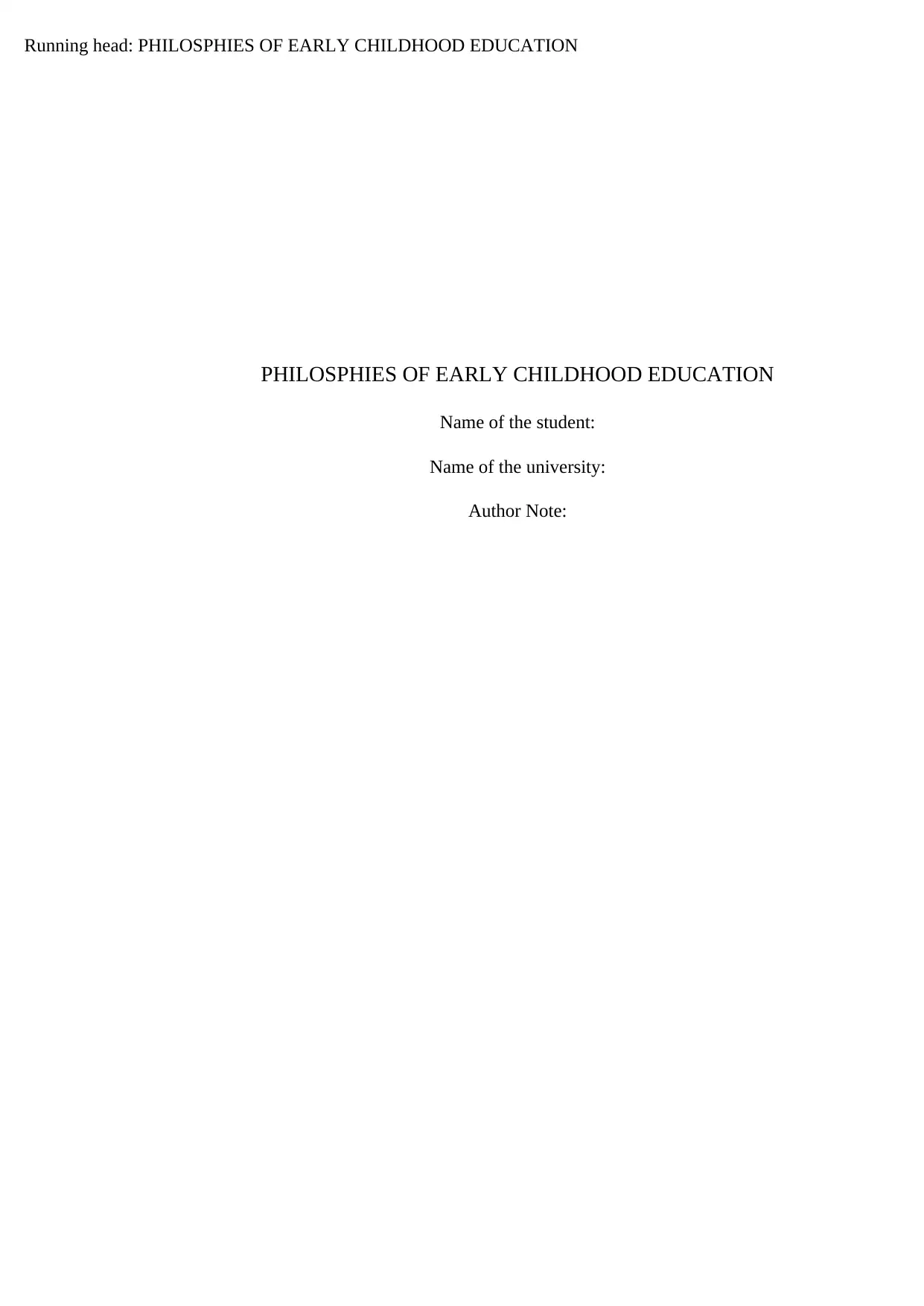
Running head: PHILOSPHIES OF EARLY CHILDHOOD EDUCATION
PHILOSPHIES OF EARLY CHILDHOOD EDUCATION
Name of the student:
Name of the university:
Author Note:
PHILOSPHIES OF EARLY CHILDHOOD EDUCATION
Name of the student:
Name of the university:
Author Note:
Secure Best Marks with AI Grader
Need help grading? Try our AI Grader for instant feedback on your assignments.
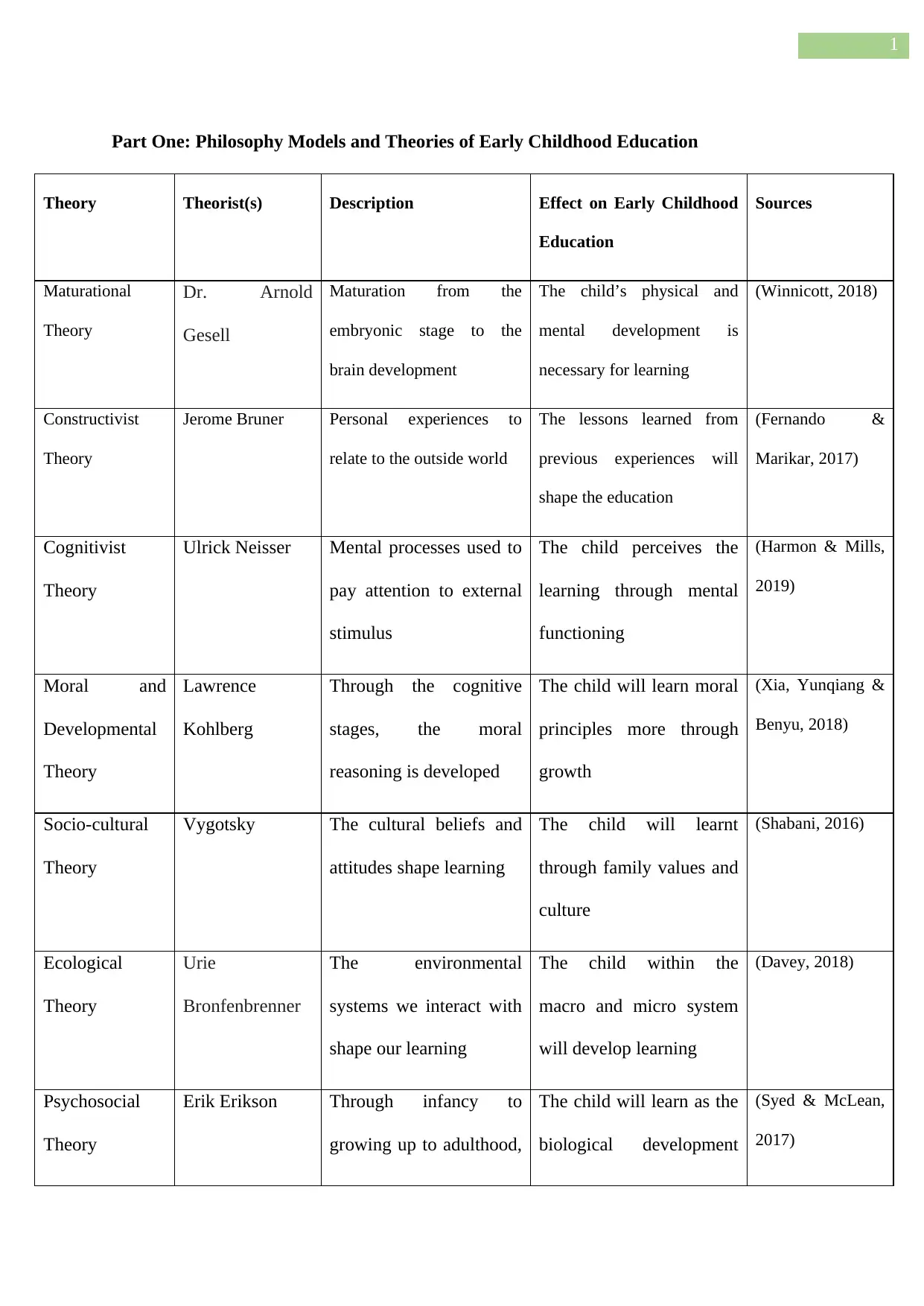
1
Part One: Philosophy Models and Theories of Early Childhood Education
Theory Theorist(s) Description Effect on Early Childhood
Education
Sources
Maturational
Theory
Dr. Arnold
Gesell
Maturation from the
embryonic stage to the
brain development
The child’s physical and
mental development is
necessary for learning
(Winnicott, 2018)
Constructivist
Theory
Jerome Bruner Personal experiences to
relate to the outside world
The lessons learned from
previous experiences will
shape the education
(Fernando &
Marikar, 2017)
Cognitivist
Theory
Ulrick Neisser Mental processes used to
pay attention to external
stimulus
The child perceives the
learning through mental
functioning
(Harmon & Mills,
2019)
Moral and
Developmental
Theory
Lawrence
Kohlberg
Through the cognitive
stages, the moral
reasoning is developed
The child will learn moral
principles more through
growth
(Xia, Yunqiang &
Benyu, 2018)
Socio-cultural
Theory
Vygotsky The cultural beliefs and
attitudes shape learning
The child will learnt
through family values and
culture
(Shabani, 2016)
Ecological
Theory
Urie
Bronfenbrenner
The environmental
systems we interact with
shape our learning
The child within the
macro and micro system
will develop learning
(Davey, 2018)
Psychosocial
Theory
Erik Erikson Through infancy to
growing up to adulthood,
The child will learn as the
biological development
(Syed & McLean,
2017)
Part One: Philosophy Models and Theories of Early Childhood Education
Theory Theorist(s) Description Effect on Early Childhood
Education
Sources
Maturational
Theory
Dr. Arnold
Gesell
Maturation from the
embryonic stage to the
brain development
The child’s physical and
mental development is
necessary for learning
(Winnicott, 2018)
Constructivist
Theory
Jerome Bruner Personal experiences to
relate to the outside world
The lessons learned from
previous experiences will
shape the education
(Fernando &
Marikar, 2017)
Cognitivist
Theory
Ulrick Neisser Mental processes used to
pay attention to external
stimulus
The child perceives the
learning through mental
functioning
(Harmon & Mills,
2019)
Moral and
Developmental
Theory
Lawrence
Kohlberg
Through the cognitive
stages, the moral
reasoning is developed
The child will learn moral
principles more through
growth
(Xia, Yunqiang &
Benyu, 2018)
Socio-cultural
Theory
Vygotsky The cultural beliefs and
attitudes shape learning
The child will learnt
through family values and
culture
(Shabani, 2016)
Ecological
Theory
Urie
Bronfenbrenner
The environmental
systems we interact with
shape our learning
The child within the
macro and micro system
will develop learning
(Davey, 2018)
Psychosocial
Theory
Erik Erikson Through infancy to
growing up to adulthood,
The child will learn as the
biological development
(Syed & McLean,
2017)
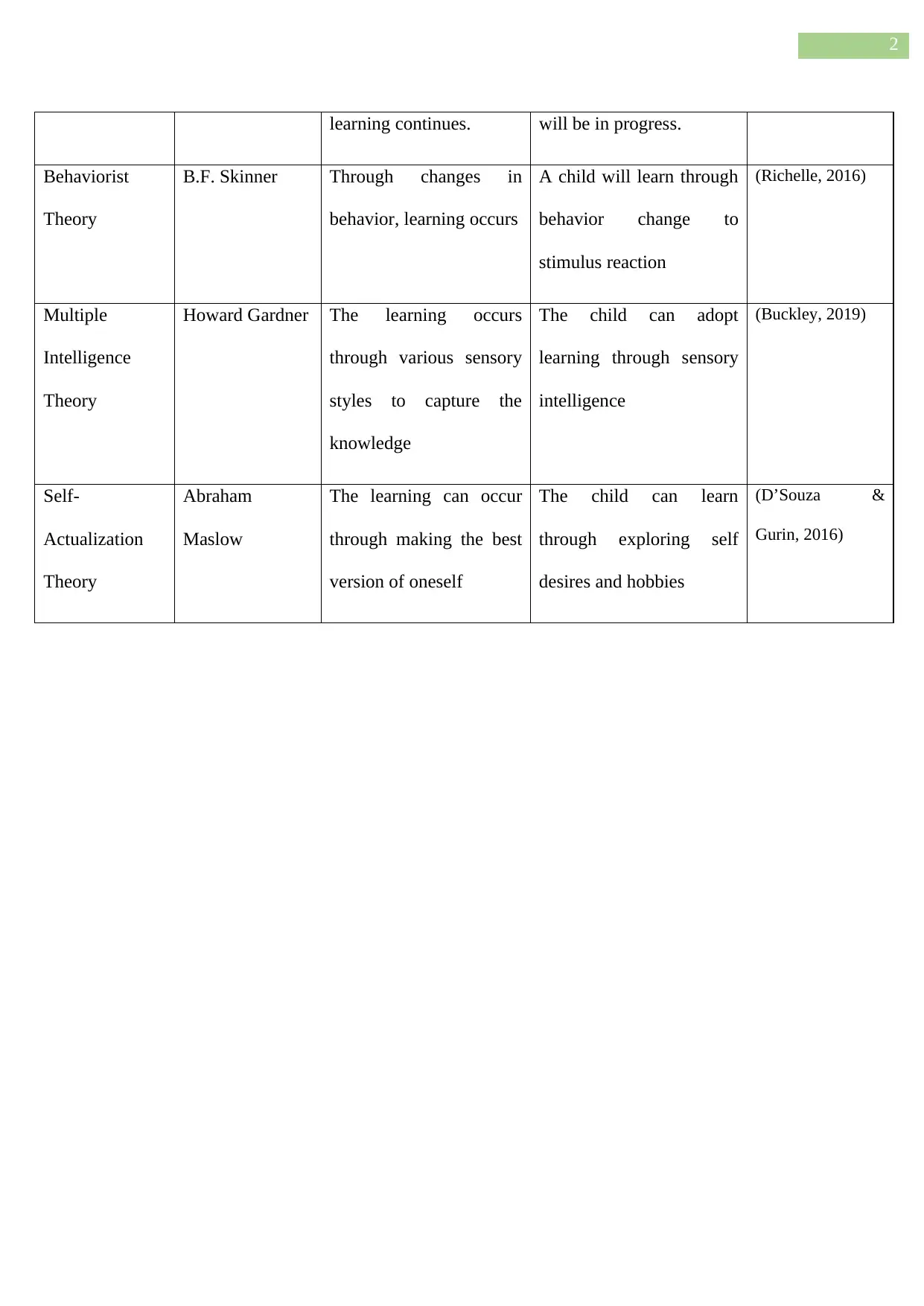
2
learning continues. will be in progress.
Behaviorist
Theory
B.F. Skinner Through changes in
behavior, learning occurs
A child will learn through
behavior change to
stimulus reaction
(Richelle, 2016)
Multiple
Intelligence
Theory
Howard Gardner The learning occurs
through various sensory
styles to capture the
knowledge
The child can adopt
learning through sensory
intelligence
(Buckley, 2019)
Self-
Actualization
Theory
Abraham
Maslow
The learning can occur
through making the best
version of oneself
The child can learn
through exploring self
desires and hobbies
(D’Souza &
Gurin, 2016)
learning continues. will be in progress.
Behaviorist
Theory
B.F. Skinner Through changes in
behavior, learning occurs
A child will learn through
behavior change to
stimulus reaction
(Richelle, 2016)
Multiple
Intelligence
Theory
Howard Gardner The learning occurs
through various sensory
styles to capture the
knowledge
The child can adopt
learning through sensory
intelligence
(Buckley, 2019)
Self-
Actualization
Theory
Abraham
Maslow
The learning can occur
through making the best
version of oneself
The child can learn
through exploring self
desires and hobbies
(D’Souza &
Gurin, 2016)
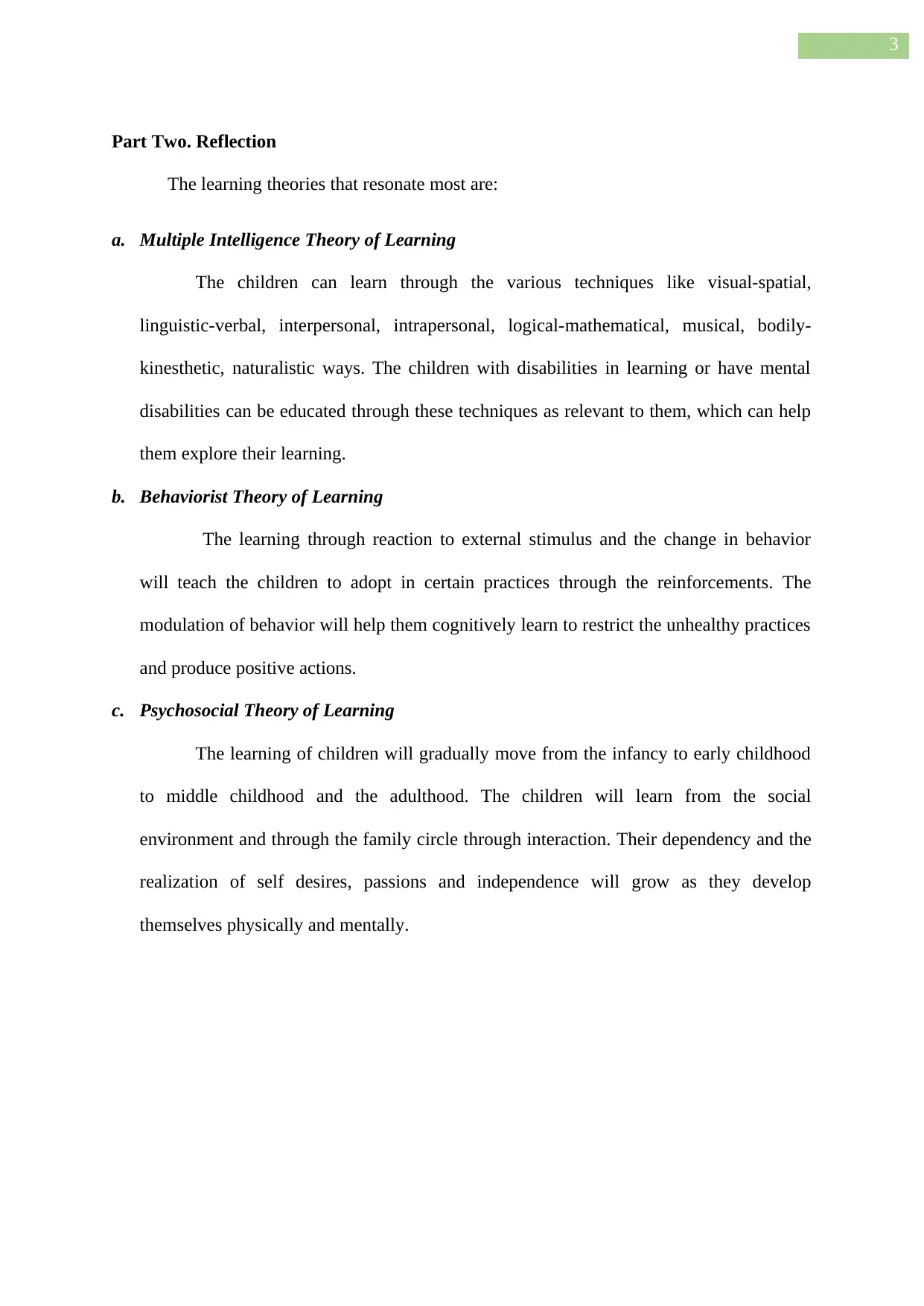
3
Part Two. Reflection
The learning theories that resonate most are:
a. Multiple Intelligence Theory of Learning
The children can learn through the various techniques like visual-spatial,
linguistic-verbal, interpersonal, intrapersonal, logical-mathematical, musical, bodily-
kinesthetic, naturalistic ways. The children with disabilities in learning or have mental
disabilities can be educated through these techniques as relevant to them, which can help
them explore their learning.
b. Behaviorist Theory of Learning
The learning through reaction to external stimulus and the change in behavior
will teach the children to adopt in certain practices through the reinforcements. The
modulation of behavior will help them cognitively learn to restrict the unhealthy practices
and produce positive actions.
c. Psychosocial Theory of Learning
The learning of children will gradually move from the infancy to early childhood
to middle childhood and the adulthood. The children will learn from the social
environment and through the family circle through interaction. Their dependency and the
realization of self desires, passions and independence will grow as they develop
themselves physically and mentally.
Part Two. Reflection
The learning theories that resonate most are:
a. Multiple Intelligence Theory of Learning
The children can learn through the various techniques like visual-spatial,
linguistic-verbal, interpersonal, intrapersonal, logical-mathematical, musical, bodily-
kinesthetic, naturalistic ways. The children with disabilities in learning or have mental
disabilities can be educated through these techniques as relevant to them, which can help
them explore their learning.
b. Behaviorist Theory of Learning
The learning through reaction to external stimulus and the change in behavior
will teach the children to adopt in certain practices through the reinforcements. The
modulation of behavior will help them cognitively learn to restrict the unhealthy practices
and produce positive actions.
c. Psychosocial Theory of Learning
The learning of children will gradually move from the infancy to early childhood
to middle childhood and the adulthood. The children will learn from the social
environment and through the family circle through interaction. Their dependency and the
realization of self desires, passions and independence will grow as they develop
themselves physically and mentally.
Secure Best Marks with AI Grader
Need help grading? Try our AI Grader for instant feedback on your assignments.
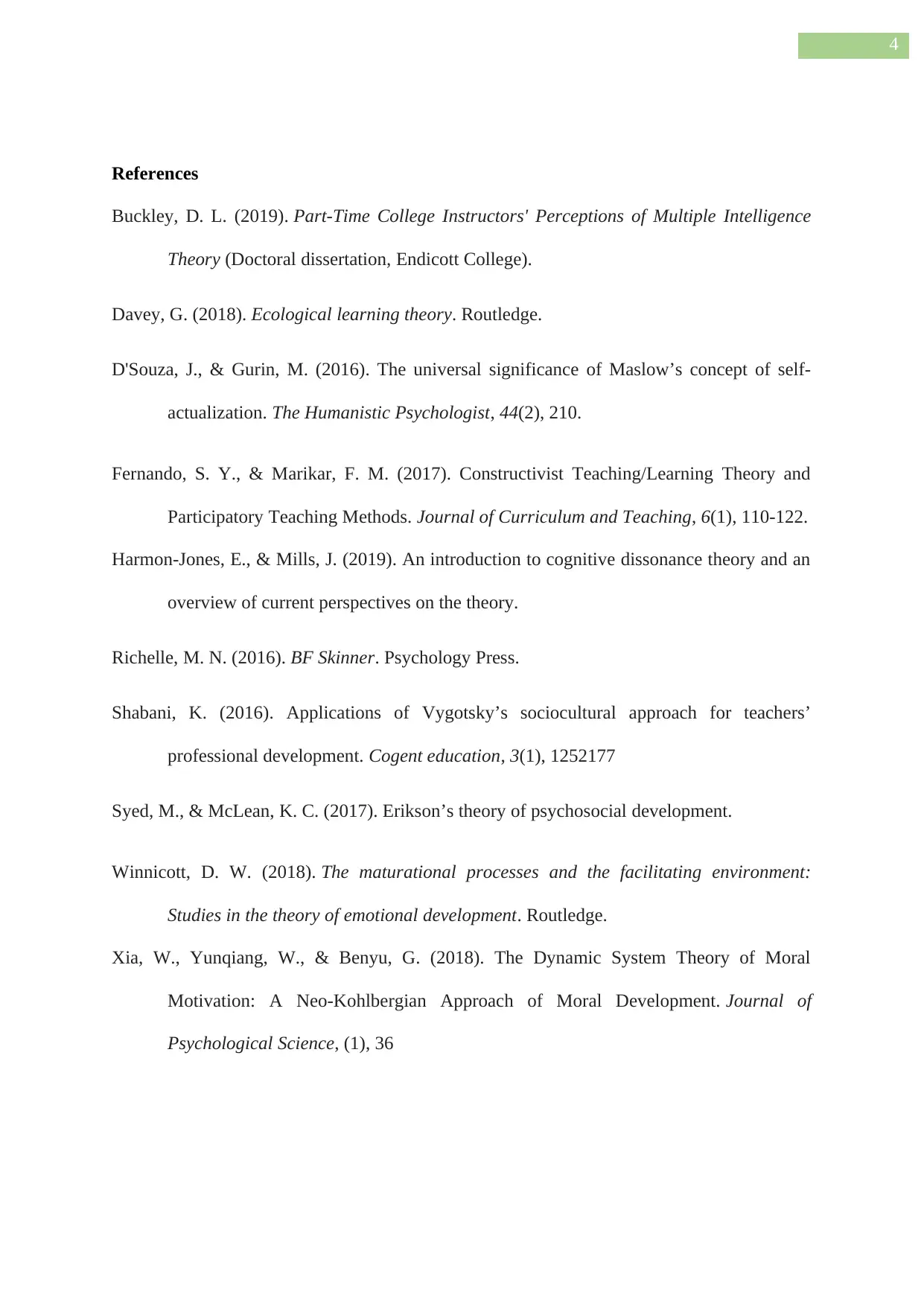
4
References
Buckley, D. L. (2019). Part-Time College Instructors' Perceptions of Multiple Intelligence
Theory (Doctoral dissertation, Endicott College).
Davey, G. (2018). Ecological learning theory. Routledge.
D'Souza, J., & Gurin, M. (2016). The universal significance of Maslow’s concept of self-
actualization. The Humanistic Psychologist, 44(2), 210.
Fernando, S. Y., & Marikar, F. M. (2017). Constructivist Teaching/Learning Theory and
Participatory Teaching Methods. Journal of Curriculum and Teaching, 6(1), 110-122.
Harmon-Jones, E., & Mills, J. (2019). An introduction to cognitive dissonance theory and an
overview of current perspectives on the theory.
Richelle, M. N. (2016). BF Skinner. Psychology Press.
Shabani, K. (2016). Applications of Vygotsky’s sociocultural approach for teachers’
professional development. Cogent education, 3(1), 1252177
Syed, M., & McLean, K. C. (2017). Erikson’s theory of psychosocial development.
Winnicott, D. W. (2018). The maturational processes and the facilitating environment:
Studies in the theory of emotional development. Routledge.
Xia, W., Yunqiang, W., & Benyu, G. (2018). The Dynamic System Theory of Moral
Motivation: A Neo-Kohlbergian Approach of Moral Development. Journal of
Psychological Science, (1), 36
References
Buckley, D. L. (2019). Part-Time College Instructors' Perceptions of Multiple Intelligence
Theory (Doctoral dissertation, Endicott College).
Davey, G. (2018). Ecological learning theory. Routledge.
D'Souza, J., & Gurin, M. (2016). The universal significance of Maslow’s concept of self-
actualization. The Humanistic Psychologist, 44(2), 210.
Fernando, S. Y., & Marikar, F. M. (2017). Constructivist Teaching/Learning Theory and
Participatory Teaching Methods. Journal of Curriculum and Teaching, 6(1), 110-122.
Harmon-Jones, E., & Mills, J. (2019). An introduction to cognitive dissonance theory and an
overview of current perspectives on the theory.
Richelle, M. N. (2016). BF Skinner. Psychology Press.
Shabani, K. (2016). Applications of Vygotsky’s sociocultural approach for teachers’
professional development. Cogent education, 3(1), 1252177
Syed, M., & McLean, K. C. (2017). Erikson’s theory of psychosocial development.
Winnicott, D. W. (2018). The maturational processes and the facilitating environment:
Studies in the theory of emotional development. Routledge.
Xia, W., Yunqiang, W., & Benyu, G. (2018). The Dynamic System Theory of Moral
Motivation: A Neo-Kohlbergian Approach of Moral Development. Journal of
Psychological Science, (1), 36

5
1 out of 6
Related Documents
Your All-in-One AI-Powered Toolkit for Academic Success.
+13062052269
info@desklib.com
Available 24*7 on WhatsApp / Email
![[object Object]](/_next/static/media/star-bottom.7253800d.svg)
Unlock your academic potential
© 2024 | Zucol Services PVT LTD | All rights reserved.





